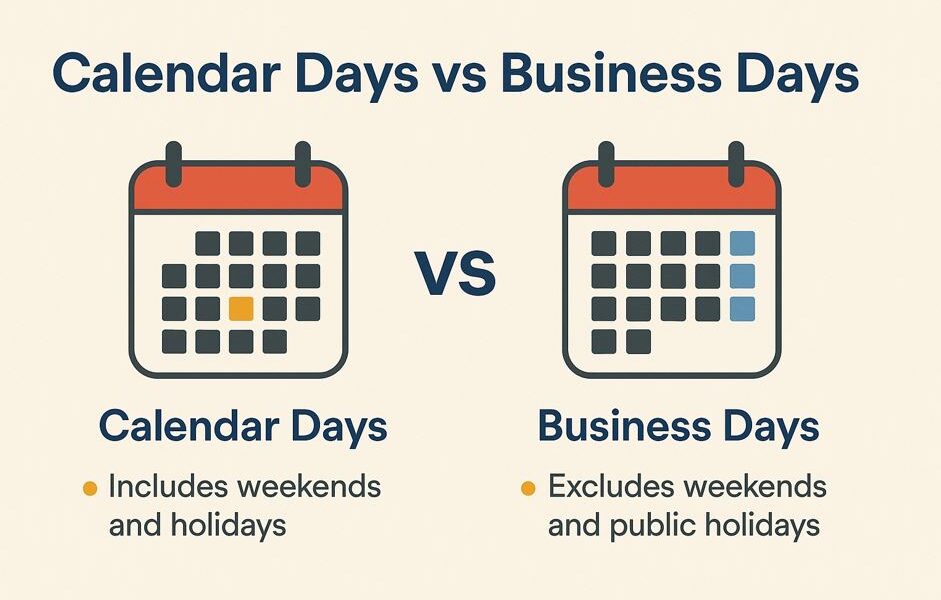Introduction to Calendar Days Vs Business Days
Calendar days are refer to every single day on the calendar. This means that weekends, holidays, and weekdays are all counted equally when you measure time in calendar days.
For example, if you say “5 calendar days” starting from a Monday, you count Monday, Tuesday, Wednesday, Thursday, and Friday — the total of 5 days. It doesn’t matter if one of those days is a weekend or a holiday; each day counts as one calendar day.
How calendar days are counted (including weekends and holidays)
Calendar days are straightforward — they are continuous and consecutive. If something takes 7 calendar days, you simply count every day on the calendar until you reach the seventh day.
Definition of Business Days
Business days are typically the days when regular business operations occur. Most commonly, these are Monday through Friday, excluding public holidays.
For example, if a bank says a process takes 3 business days, it means it will take three working days, not counting weekends or official holidays.
Common business day schedules (Monday to Friday, excluding public holidays)
Business days are counted without weekends (Saturday and Sunday) or public holidays. This is because most businesses, government offices, and banks are closed on these days.
If a deadline is 5 business days, and it starts on a Thursday, you would count Thursday and Friday, skip the weekend, then count Monday, Tuesday, and Wednesday — making Wednesday the final day.
Why understanding calendar vs business days matters
Knowing whether a timeframe is based on calendar days or business days can save you from confusion and missed deadlines. It helps you manage expectations accurately, especially for important activities like deliveries, legal contracts, or payments.
Common scenarios where the distinction is crucial (shipping, contracts, deadlines)
- Shipping: Many online retailers provide delivery estimates in business days, so weekends won’t count toward your wait time.
- Contracts: Legal agreements often specify deadlines in calendar or business days, impacting when obligations must be fulfilled.
- Deadlines: Understanding this distinction ensures you don’t accidentally miss important due dates for applications, payments, or submissions.
Key Differences Between Calendar Days and Business Days
Inclusion of Weekends and Holidays
The biggest difference between calendar days and business days is the inclusion or exclusion of weekends and public holidays.
- Calendar days: Include every day, no exceptions.
- Business days: Exclude weekends and official holidays.
This means that a 10-day deadline in calendar days will end sooner than a 10-day deadline in business days, especially if there are weekends or holidays in between.
Counting Methods (How to count calendar days)
Counting calendar days is simple: start from the first day (which counts as day one) and keep counting each day until you reach the total number of days.
How to count business days
Counting business days requires skipping all Saturdays, Sundays, and public holidays. The starting day counts only if it is a business day.
For example, if you start counting on a Friday with a 3-business-day deadline, you count Friday as day one, skip the weekend, then Monday as day two, and Tuesday as day three.
Impact on Deadlines and Timeframes
Examples showing how deadlines change depending on day type
Let’s say you submit a document on Wednesday, and you have 5 calendar days to get approval:
- Calendar days deadline: Wednesday (day 1), Thursday (2), Friday (3), Saturday (4), Sunday (5).
- You would get the approval by Sunday.
If it’s 5 business days instead:
- Business days deadline: Wednesday (1), Thursday (2), Friday (3), Monday (4), Tuesday (5).
- You get approval by Tuesday instead.
Potential confusion and delays caused by misunderstanding
Misinterpreting calendar days as business days or vice versa can cause missed deadlines, late payments, or delivery delays. For example, a business might promise shipment within “5 business days” but a customer could mistakenly think it means calendar days, leading to frustration.
Common Uses and Applications
In Business and Legal Contexts
Contractual deadlines
Contracts often specify timelines in business days to ensure fairness, since weekends and holidays usually don’t count as operational days.
Payment terms and invoicing
Invoices may state “net 30 business days,” meaning payment is due within 30 working days, excluding weekends and holidays.
Shipping and Delivery Estimates
How carriers calculate delivery times
Shipping companies usually provide delivery estimates in business days. This helps avoid counting days when no deliveries occur (like weekends).
Understanding “business days” in shipping policies
If a shipping policy states “delivers in 7 business days,” a package shipped on Friday will likely arrive the next Friday or later, because the weekend doesn’t count.
Project Management and Scheduling
Planning tasks and timelines
Project managers use business days to plan tasks realistically, excluding non-working days.
Use of business days in work schedules
Work schedules, meeting deadlines, and employee time tracking often revolve around business days for clarity.
How to Calculate Calendar Days vs Business Days
Tools and Methods for Calculation
When it comes to figuring out calendar days versus business days, knowing how to calculate them correctly is essential.
Manual calculation tips
For calendar days, it’s as simple as counting every day starting from your start date. For business days, you count only the weekdays (Monday to Friday) and skip weekends and holidays. A handy tip is to mark your calendar and cross out weekends and holidays as you go.
Online calculators and software tools
To make this easier, plenty of online calculators let you enter a start date and the number of days, and they will automatically calculate the end date for both calendar and business days. Tools like Google Sheets, Microsoft Excel (using the NETWORKDAYS function), and dedicated date calculators can save time and reduce errors.
Accounting for Holidays and Regional Variations
Importance of local holidays in business day calculations
Business days exclude weekends and public holidays, but these holidays vary by country and region. For example, a public holiday in the U.S. like Thanksgiving won’t count as a business day there, but it might be a normal working day in another country.
Adjusting calculations for international differences
If you’re dealing with international deadlines or shipping, it’s important to consider regional holidays. Many online tools allow you to input country-specific holiday calendars to get an accurate business day count.
Practical Examples and Step-by-Step Calculations
Sample scenarios with both calendar and business day counts
Let’s say you receive a notice on Monday that you have 10 calendar days to respond:
- Calendar days: Count Monday as day 1, then Tuesday (2), Wednesday (3), and so on, until day 10, which would be the following Wednesday.
- Business days: Starting Monday as day 1, count only weekdays, skipping the weekend. Your 10th business day would land two weeks later on the Friday after the next.
By walking through scenarios like this, you get a clear understanding of how timelines stretch depending on which days you count.
Conclusion
Summary of Key Points
- Calendar days count every day, including weekends and holidays.
- Business days include only working days, typically Monday to Friday, excluding holidays.
- Understanding this difference is crucial for contracts, shipping, deadlines, and payments.
- Accurate calculation requires attention to holidays and regional differences.
Final Tips for Avoiding Confusion Between Calendar Days and Business Days
Always double-check whether a deadline or timeframe refers to calendar days or business days, especially in contracts or shipping policies. When in doubt, ask for clarification to avoid missed deadlines or misunderstandings.
Encouragement to Clarify Terms in Contracts and Communication
Clear communication helps everyone stay on the same page. When drafting or agreeing to terms, specify whether deadlines are in calendar days or business days. This simple step can prevent costly mistakes and frustration down the line.
FAQs
Is calendar day the same as business day?
No. Calendar days include every day on the calendar, while business days count only weekdays (Monday to Friday), excluding weekends and public holidays.
Is 14 calendar days the same as 10 business days?
Not necessarily. 14 calendar days means two full weeks straight, including weekends. 10 business days means you only count weekdays, which often stretch over about two weeks and a half, depending on holidays.
Do calendar days count weekends?
Yes. Calendar days count every day, including weekends and holidays.
What do you mean by calendar days?
Calendar days mean counting all days continuously on the calendar — Monday through Sunday, including holidays and weekends.
Found this guide useful? Share it or leave a comment below! Follow High Groth For More.









